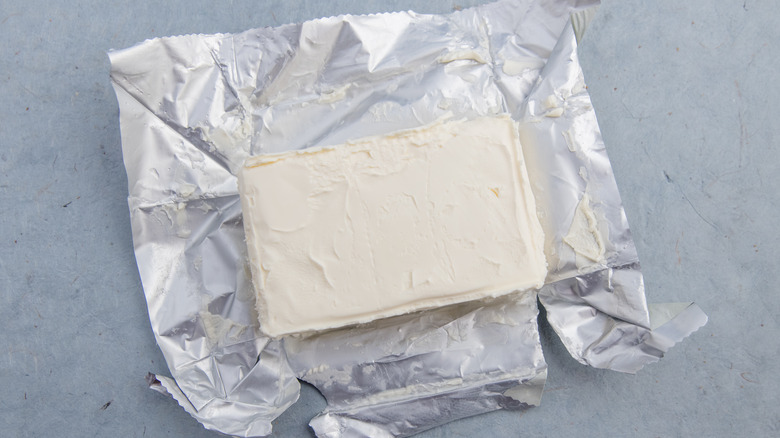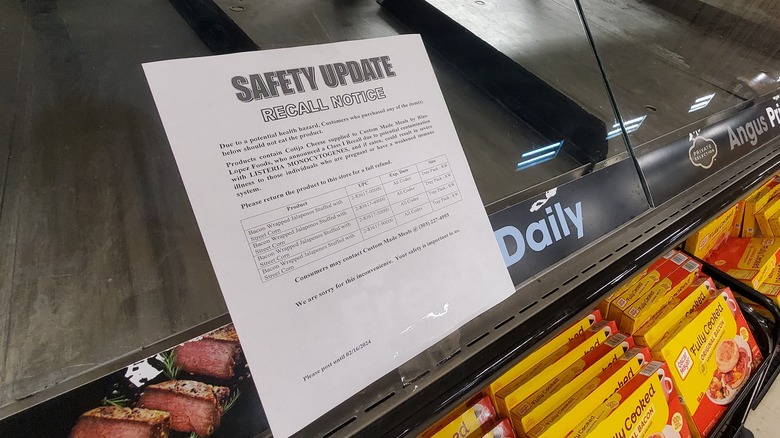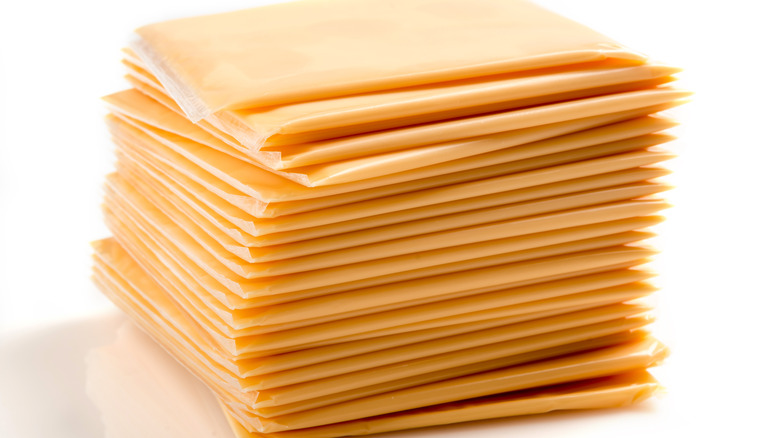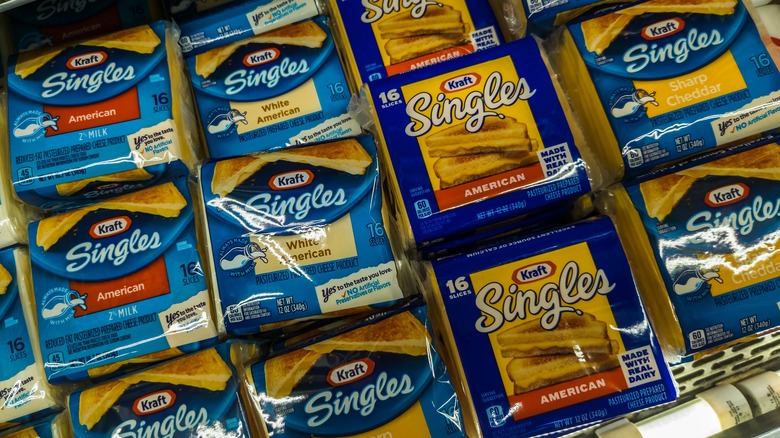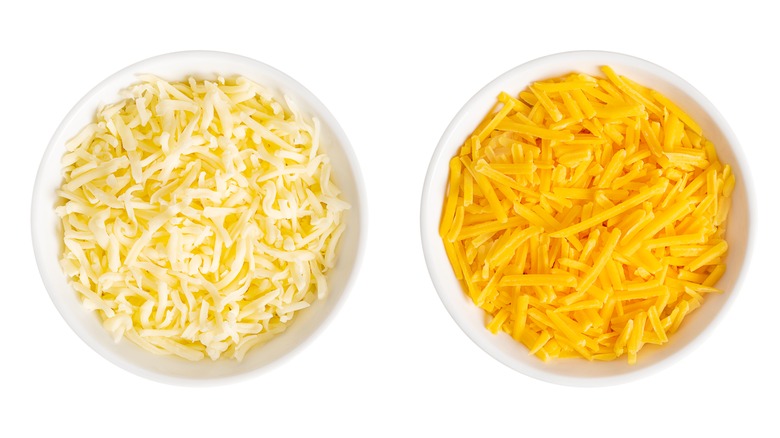The Biggest Cheese Recalls In US History
Cheese has a place in the majority of American diets, and naturally, with so much cheese produced in the United States, things have inevitably gone wrong from time to time. Over the course of the past half-decade or so, cheese products have been recalled for a wide range of reasons, from defective packaging to deadly listeria outbreaks. It's worth noting up front that these cases are all essentially outliers — one deadly outbreak doesn't mean that the cheese at your grocery store is unsafe to consume. Rather, one mistake is all it takes for what otherwise might be a safe product to have to be recalled in massive quantities.
We combed through results from Food Industry Counsel's search engine to find the highest quantities of product recalled in addition to cases notable for other reasons, such as their deadliness or national scope. Overall, food recalls have become more prominent in post-pandemic years, which some experts attributed to a confluence of factors. While the rising popularity of processed foods has increased risk level, testing standards have also improved, increasing the likelihood of identifying dangers. Read on for detailed accounts of the biggest cheese recalls in U.S. history.
Schreiber Foods (May 2024)
As will become increasingly clear as this list progresses, listeria is the leading cause of major cheese recalls in the United States. However, in May 2024, it was salmonella, rather, that necessitated dairy brand Schreiber Foods to recall over 415,000 pounds of cream cheese from stores, according to Food Industry Council data. Eggs are more typically associated with salmonella, and fittingly, eggs were recalled in nine states over salmonella concerns just months later — but salmonella isn't limited to just eggs or meat.
Schreiber Foods cream cheese products encompassed by the recall were sold at iconic budget grocery store chain Aldi, Dunkin', Hy-Vee, Kroger, and more. At Aldi alone, four distinct flavors of cream cheese available at stores in 29 states ended up recalled. For what it's worth, it was through no error of Schreiber's that these cream cheese products were determined to be at risk for carrying salmonella. Rather, an unnamed supplier informed the company that an unspecified ingredient might contain salmonella, so Schreiber responded by recalling every cream cheese product that could potentially contain the tainted ingredient. Fortunately, zero illnesses were reported originating from one of their cream cheese products. Customers who had purchased the potentially affected cream cheese were encouraged to return it for a refund.
Rizo-López Foods (February 2024)
While listeria is often identified in a product that gets recalled before any cases are reported, the most recent listeria-prompted recall on this list, did, unfortunately, follow a nationwide outbreak. In February 2024, all dairy products including cheeses, yogurts, and sour creams produced by a company called Rizo-López Foods were subject to a recall after the Centers for Disease Control and Prevention (CDC) and the Food and Drug Administration (FDA) linked the company to active listeria infections. Unsurprisingly, this also qualified as one of the biggest food recalls of 2024.
In total, 26 people in 11 states were identified with infections caused by the same listeria outbreak. Of those, 23 were hospitalized, and two people died, according to data published by the FDA. In October, a court in the company's home state of California ruled that Rizo-López Foods would be prohibited from producing or selling products until it could meet certain requirements. In essence, the company seems to have been found violating FDA regulations and could resume production only after those violations were amended. While the numerical scope of this recall isn't entirely clear, it extended not only to Rizo-López products but also to items like salad kits, dips, and more produced at stores like Bristol Farms and even Trader Joe's that contained Rizo-López cheeses.
Great Lakes Cheese Co. (August 2023)
A Wisconsin company called Great Lakes Cheese Co. — responsible not for producing but packaging cheeses for a range of brands — announced a recall of a whopping 7,218,700 pounds of cheese in August 2023, per a Food Industry Counsel report. Behind this massive recall were erroneous refrigeration instructions on a variety of processed cheeses. Theoretically, those cheeses might not have been refrigerated at the required temperatures if stores were following the misprinted instructions to the letter. Stores like Midwest grocery mainstay Meijer, Giant Eagle, Dutch Farms, Food Lion, Great Value, Aldi, and many more in 32 states carried products recalled at that time.
What's unique about this recall is a relative lack of media coverage, despite its immense scale. It's safe to assume that stores maintain a standard refrigeration temperature for products, even if their packaging may technically state a lower temperature. As a result, it may well have been a very small percentage of the millions of pounds of recalled cheeses that were ultimately returned, hence such scant media coverage. So, while this may nevertheless be one of the biggest cheese recalls in United States history, it's also notable for its negligible impact relative to its colossal size.
Old Europe Cheese (September 2022)
In another case of active listeria infections necessitating a major cheese recall, cheese producer Old Europe Cheese announced a recall of over 130,000 pounds of Brie and Camembert products in September 2022, according to Food Industry Counsel data. At that time, cheeses sold by brands like Black Bear, Charmant, Joan of Arc, La Bonne Vie, Reny Picot, and more, including one Trader Joe's product, were all encompassed by the recall. Geographically, it spanned the entire United States and even some stores in Mexico.
Old Europe Cheese expanded the scope of its recall the following month, and while the list of additional products wasn't necessarily massive, the company was likely trying to cover its bases given that a sample at its production facility had, in fact, tested positive for listeria. The following year, the FDA sent Old Europe Cheese an official warning letter after determining that it had not followed certain FDA safety guidelines. Altogether, the CDC and the FDA linked six people, five of whom were hospitalized, to the strain of listeria identified at the Old Europe Cheese production facility.
Great Lakes Cheese Co. (October 2019)
Great Lakes Cheese Co. announced in October 2019 that it was recalling just over 400,000 pounds of American cheese products, per Food Industry Counsel data. Whereas listeria risk is considered a Class I recall, indicating the highest level of danger, this was considered a Class III recall, indicating that while it is not likely to cause health issues, there is some risk but it's at the lowest level possible on the three-tiered scale. Nevertheless, the quantity of product involved makes this one of the biggest United States cheese recalls all the same.
The impetus for Great Lakes Cheese Co. recalling such significant quantities of its cheese products was the possibility that they might have contained metal fragments. A variety of stores including Wegmans, Shoprite, Price Chopper, and Publix, among others, all distributed American cheese products that fell under its purview. At both Price Chopper and Publix — and likely most other stores named in the recall — American cheese supplied by Great Lakes Cheese Co. was sold either at the deli counter or in sandwiches prepared at the deli. Affected stores offered anyone with the recalled product the opportunity to return it for a full refund.
Deutsch Kase Haus (February 2017)
In February 2017, a supplier called Deutsch Kase Haus recalled 4.1 million pounds of longhorn Colby cheese with the potential to carry listeria, according to the Food Industry Counsel. Already, the scope of the recall affected brands like Walnut Creek, Meijer, Amish Classics, and Dutch Farms. What tipped the company off to the potential for listeria was a test at a grocery store in Tennessee. Not only did Deutsch Kase Haus respond with its expansive recall, but it preemptively shut down production in the plant responsible for the infected cheese. A lack of either illness or action by the FDA suggests that this was a responsible choice.
Soon, the tail of Deutsch Kase Haus' potentially tainted cheese grew larger, requiring companies like Biery Cheese Co. — supplying Delallo, Dietz & Watson, Kroger's Private Selection brand, and No. 1 ranked string cheese brand Sargento — to each issue separate cheese recalls due to the possibility that infected Colby they were supplied tainted additional products. According to the Food Industry Counsel, Biery Cheese Co. recalled over 430,000 pounds of cheese, including smoked Gouda and pepper Jack, whereas Sargento recalled over 1.2 million pounds of five cheese products, per the Food Industry Counsel. Sargento then announced the end of its working relationship with Deutsch Kase Haus, garnering mainstream news coverage from outlets like CNN and capping off a huge and multi-pronged cheese recall saga.
Kraft Heinz Company (July 2015)
Even if they don't actually qualify as cheese, Kraft Singles – technically a "food cheese product" — are synonymous with American cheese. This staple of many a hamburger was subject to a sizable recall in July 2015 when the packing on Singles in 3-pound and 4-pound boxes of both standard American and White American Kraft Singles was found to be faulty. At that time, the company announced that the volume of defective product added up to 36,000 cases throughout the United States in addition to Puerto Rico and Grand Cayman. Specifically, the issue with those Kraft Singles was a component of each cheese slice's outer plastic that erroneously remained attached even after the rest of the packaging was removed.
A couple months later, in September, The Kraft Heinz Company expanded the scope of this recall significantly. This time around, it turned out that there were actually 335,000 cases of product affected by the faulty packaging. Some of those cases were shipped to South Korea, perhaps slightly lessening its sheer scale within the United States, but those hundreds of thousands of Kraft Singles cases constitute one of the biggest domestic cheese recalls all the same.
Frescolina Marte (September 2012)
While recent food recalls are at least partially a byproduct of more stringent regulatory practices, older recalls are likely to be more severe since they were subject to lower levels of scrutiny and less sophisticated technology. Accordingly, ricotta salata cheese that a company called Forever Cheese Inc. packaged under the Frescolina Marte brand was subject to a major recall in September 2012 after it was linked to a listeria outbreak.
The bacteria at fault seemingly originated with a company exporting cheese from Italy called Fattorie Chiarappa. It ended up removing from circulation all cheeses linked to its imported products at the time of the recall. Altogether, the Forever Cheese Inc. recall spanned 30 states. The outbreak that led to all of this — which may have included infections resulting from additional, unidentified products — consisted of 22 confirmed cases of illness and four deaths, hence requiring action even under what were likely looser criteria relative to today.
Jalisco Mexican Projects Inc. (June 1985)
What may well remain the most notorious cheese recall in United States history occurred back in June 1985 after listeria bacteria was traced to a company called Jalisco Mexican Projects Inc. While the infections responsible for the recall were contained within Los Angeles County and nearby Orange County, they were so severe that it remains one of the deadliest listeria outbreaks in the nation's history. In total, 142 cases of illness were reported, including 28 deaths. News reports also cited 20 miscarriages and several children born with birth defects after their mothers became ill.
Jalisco Mexican Projects Inc. produced cheese products under four labels, the majority of which remained in California, but some of which the company sold in 16 additional states. While the recalled products responsible for the infections were limited to just the California market, media at the time warned customers away from virtually everything the company sold. Exactly what went wrong at its cheese factory was never officially determined, but the use of raw milk was a leading suspect. For their culpability in the outbreak, one of the owners of Jalisco Mexican Projects Inc. and a cheesemaker who worked for him served 30 days and 60 days in jail, respectively. Jalisco Mexican Projects Inc. was determined to be responsible for $100 million in damages, but being unable to pay out such a large sum, the company simply shut down.

